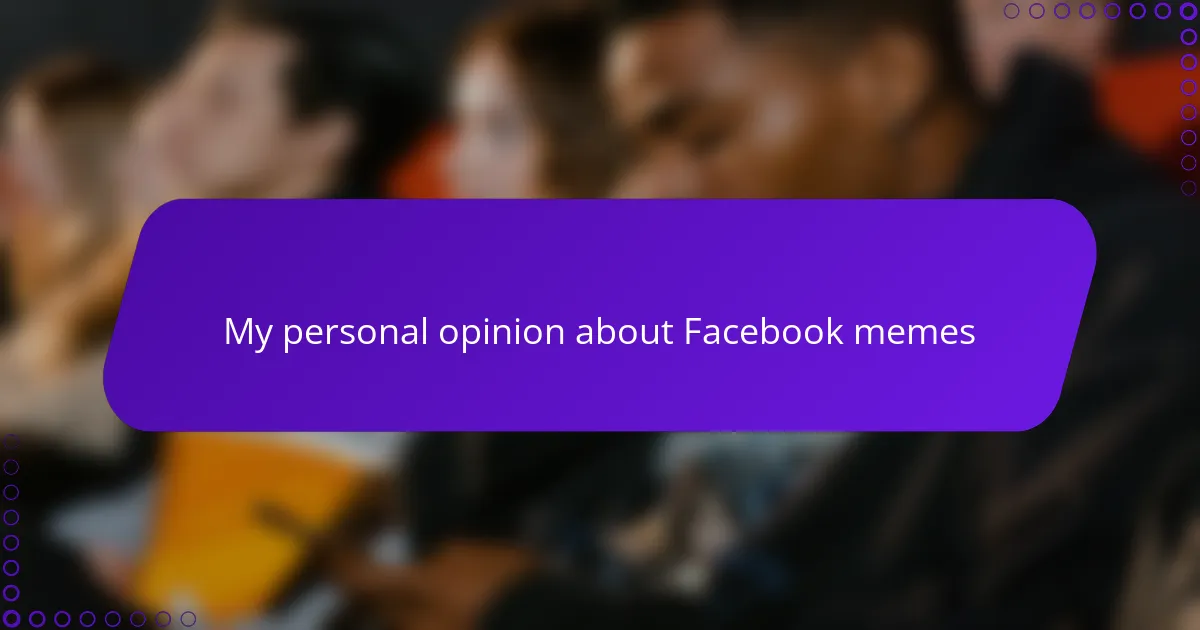Key takeaways
- Funny videos and memes serve as a relatable escape from daily stress, fostering connection and shared laughter.
- Facebook memes use everyday experiences and nostalgia to create humor that resonates across diverse audiences.
- Memes evolve rapidly, reflecting societal moods and trends, thus influencing online humor and conversation.
- Creating effective memes requires simplicity, relatability, and timely relevance to engage and connect with audiences.
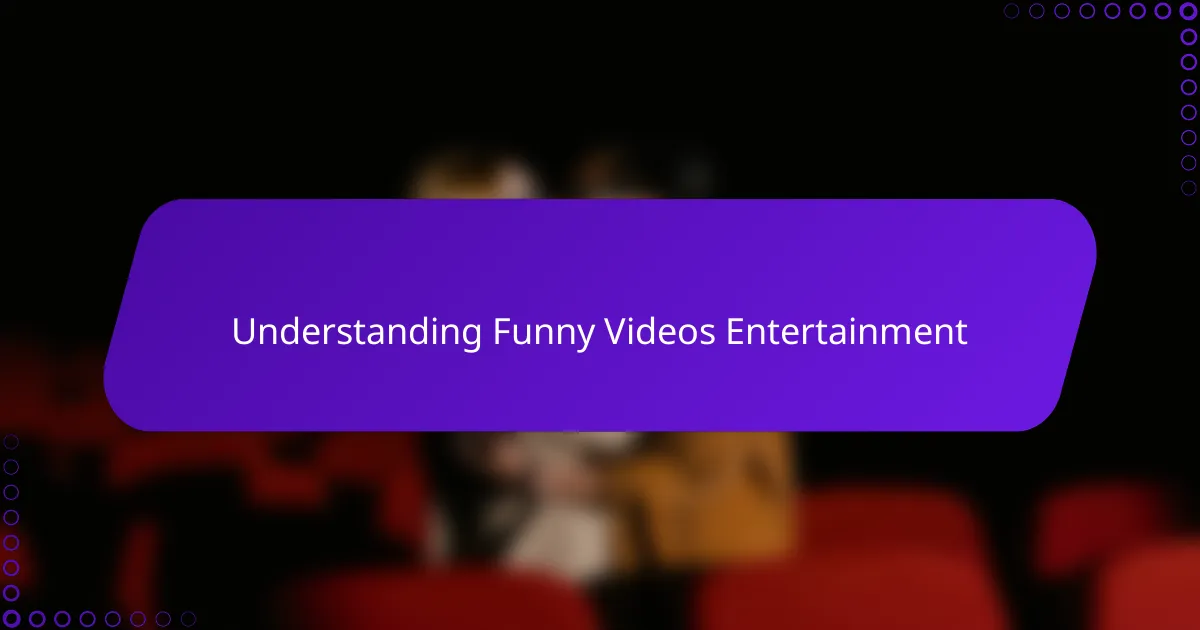
Understanding Funny Videos Entertainment
Funny videos entertainment, to me, is more than just a quick laugh—it’s a way to connect with moments of joy in everyday life. Have you ever noticed how a simple clip can brighten your mood instantly? That instant emotional lift is what keeps me coming back for more.
I think what makes funny videos so engaging is their unscripted nature. They capture genuine reactions and unexpected humor, which feels authentic and relatable. From my experience, this authenticity is what separates a fleeting chuckle from a memorable laugh.
But why are we so drawn to these light-hearted breaks in our day? I believe it’s because laughter offers a brief escape from stress, reminding us not to take life too seriously. In a world full of pressure, these snippets of fun become small, yet powerful, moments of relief.
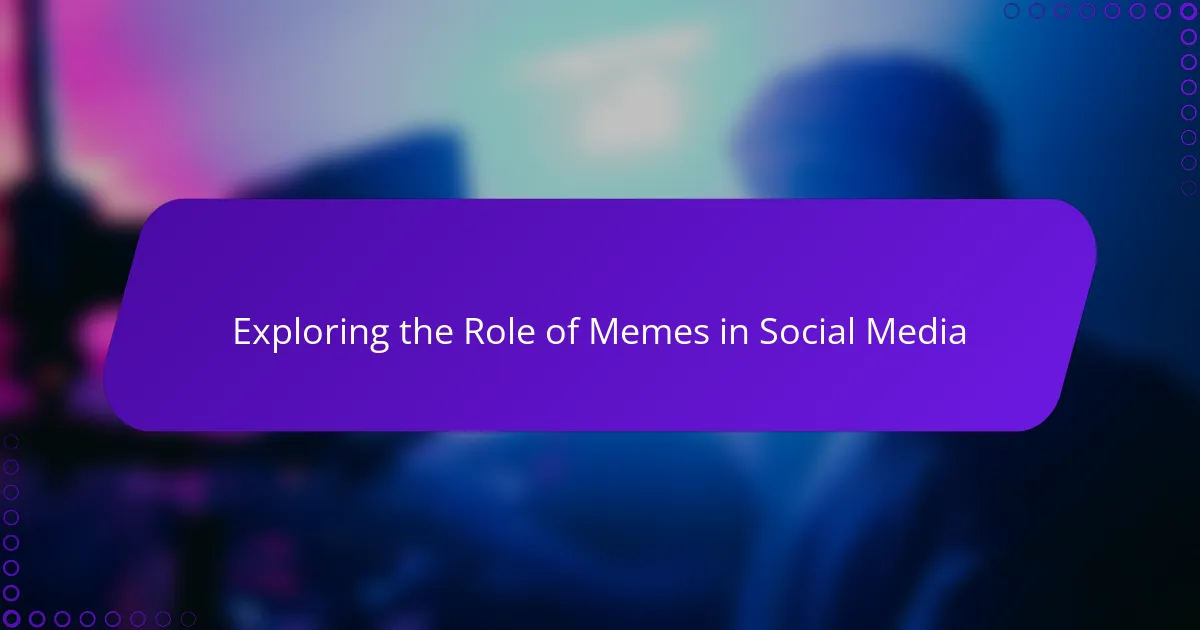
Exploring the Role of Memes in Social Media
Memes on social media have become those little snapshots of shared humor that instantly resonate with me. They’re like inside jokes among millions, making complicated ideas or everyday frustrations feel light and relatable. Have you ever sent a meme to a friend and almost immediately felt a sense of connection? That’s the power of meme culture—it creates a sense of belonging through laughter.
In my experience, memes don’t just entertain; they shape conversations and reflect current trends in real time. They often give voice to thoughts and feelings that might be hard to express otherwise, all wrapped in a clever image or phrase. It’s fascinating how a single meme can spark widespread discussion, blending humor with social commentary.
What strikes me most is the speed at which memes spread and evolve on social platforms. Their viral nature turns them into cultural markers, almost like digital folklore. I sometimes wonder how they manage to capture the spirit of a moment so perfectly and so quickly—almost like humor distilled to its purest form.
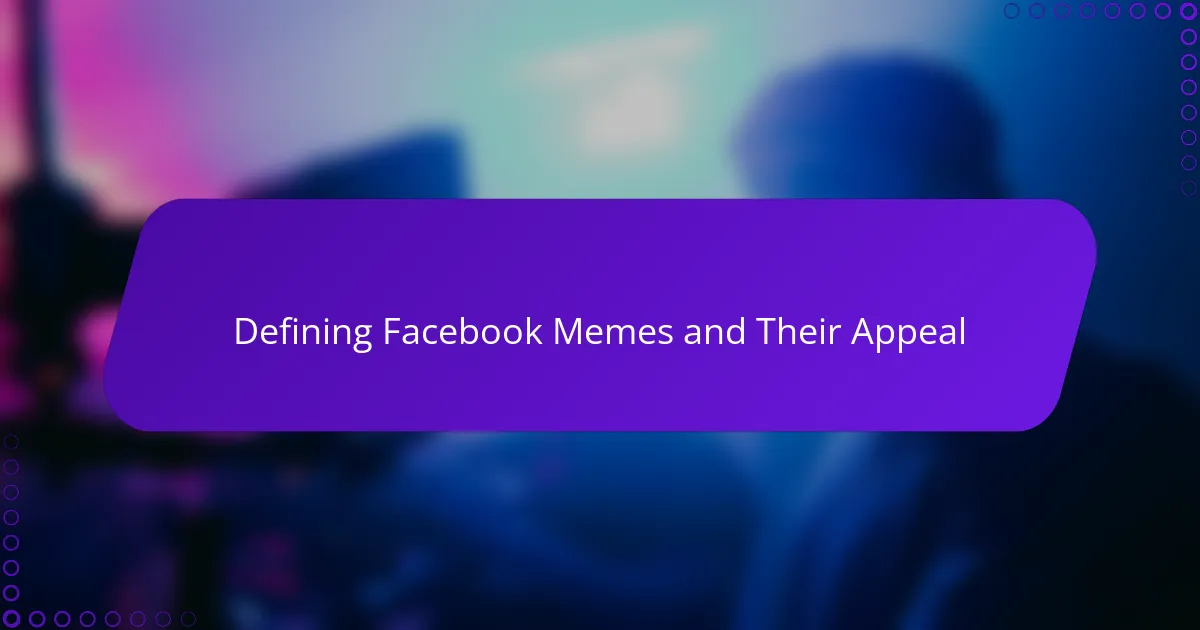
Defining Facebook Memes and Their Appeal
When I think about Facebook memes, I see them as bite-sized doses of humor perfectly tailored for quick scrolling breaks. Have you noticed how a meme can instantly capture a mood or a feeling with just a simple image and a clever caption? That’s exactly what draws me to them—their ability to communicate complex emotions or shared experiences in a split second.
What appeals to me most about Facebook memes is their accessibility; they’re everywhere, popping up in feeds alongside updates from friends and family. It’s like these memes create tiny moments of connection during otherwise routine days. I often find myself chuckling or nodding in agreement, realizing others feel the same way about life’s little absurdities.
There’s also something fascinating about how memes on Facebook evolve over time, adapting to new jokes, trends, or current events. It’s almost like they have their own life cycle, continuously reinventing themselves while staying relevant. This constant evolution keeps me engaged, always curious about what the next viral meme will capture or express.
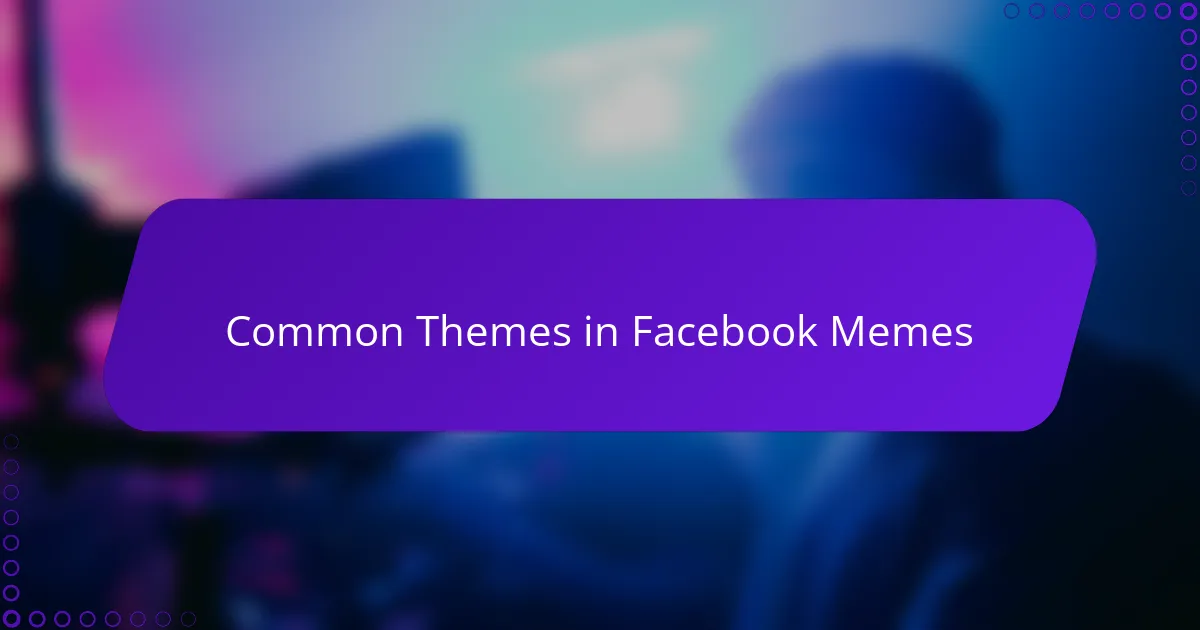
Common Themes in Facebook Memes
One common theme I notice in Facebook memes is the use of everyday struggles—those little frustrations or awkward moments we all face. Have you ever come across a meme about Monday mornings or Wi-Fi dropping at the worst time? Those simple, relatable scenarios always make me laugh because they remind me that I’m not alone in dealing with these minor annoyances.
Another frequent motif is nostalgia. I often see memes referencing childhood shows, old technology, or past trends, which immediately take me back to simpler times. It’s funny how these memes tap into shared memories, creating a warm connection through humor that spans generations on the platform.
Sometimes, Facebook memes dive into social commentary, using satire to highlight current events or popular culture. I appreciate how these memes can be both witty and thought-provoking, sparking reflection while making me smile. Don’t you find it refreshing when humor isn’t just about laughs but also makes you think?
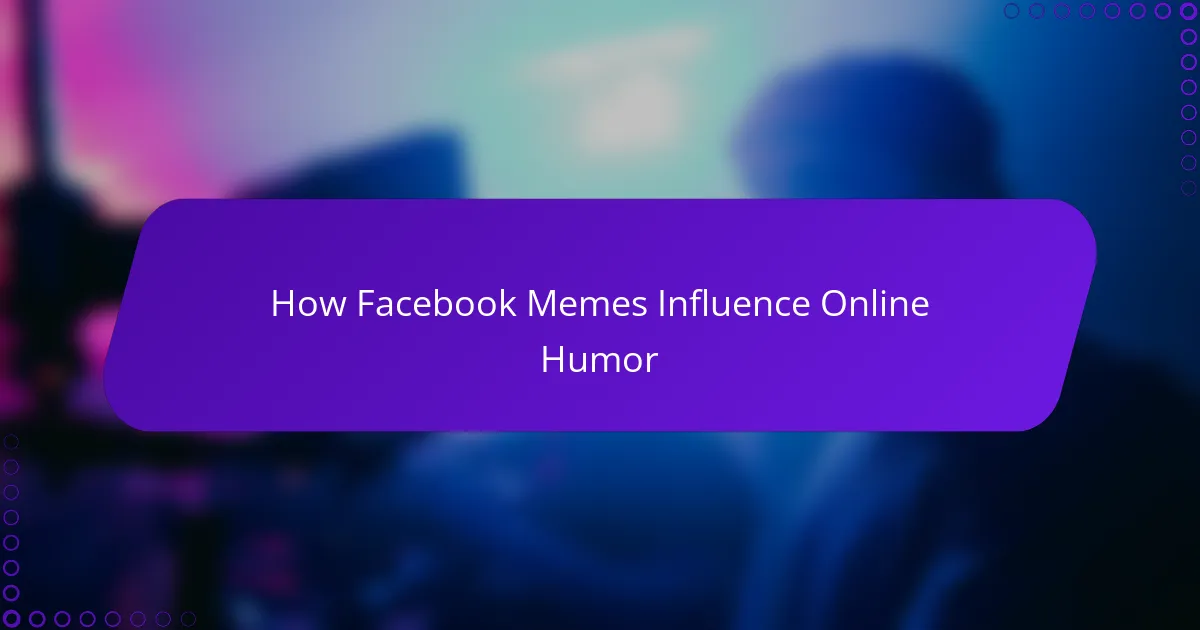
How Facebook Memes Influence Online Humor
Facebook memes have a unique way of shaping online humor by blending everyday relatability with rapid wit. I often find myself laughing at a meme that captures exactly how I’m feeling that day, which makes me realize how these small images create shared moments of understanding across diverse groups. Don’t you think that’s a powerful way humor can connect strangers instantly?
What strikes me is how Facebook memes influence the tone of humor online—favoring clever simplicity over long jokes. They push humor to be more visual and concise, something you can consume in seconds but remember for much longer. From my experience, this bite-sized delivery makes online humor more accessible, inviting even casual scrollers to become participants in the joke.
At times, I’ve noticed that Facebook memes also guide trending humor by quickly reflecting societal moods or challenges. When a meme about a common struggle goes viral, it sets a comedic theme that others pick up and riff on. This ripple effect shows me how Facebook memes don’t just entertain—they actively steer the direction of what people find funny online.
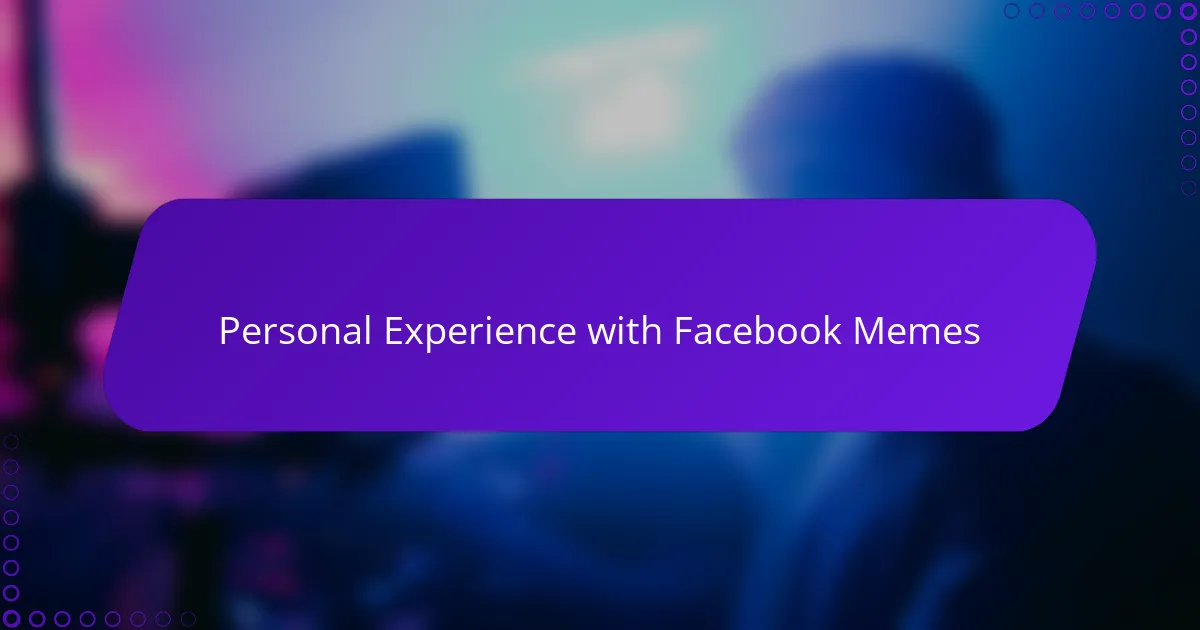
Personal Experience with Facebook Memes
Scrolling through my Facebook feed, I often stumble upon memes that perfectly capture my mood—even on days when I didn’t expect a laugh. Have you ever noticed how a simple meme can feel like a little nod from a stranger who just “gets it”? That sense of shared understanding keeps me coming back for more.
Sometimes, I catch myself saving a meme because it nails a relatable moment I experienced that week. It’s funny how these tiny images can validate my feelings or poke fun at situations I found frustrating. To me, that’s what makes Facebook memes more than just distractions—they’re brief mirrors reflecting parts of my own life.
What surprises me is how effortless it feels to share these memes with friends or family, sparking quick conversations or inside jokes. I’ve had moments where a meme sent in a chat instantly lightened the mood and brought a smile during a stressful day. Isn’t that incredible—how a few pixels can brighten a tough moment?
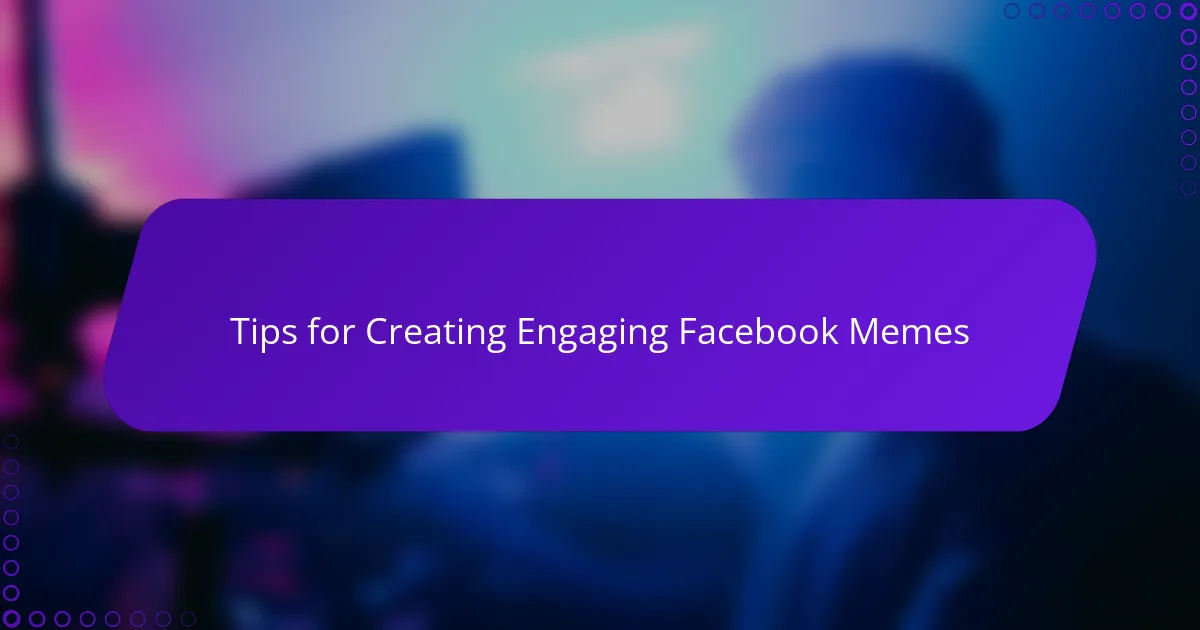
Tips for Creating Engaging Facebook Memes
Creating engaging Facebook memes starts with knowing your audience and what makes them laugh. From my experience, memes that touch on relatable everyday moments tend to get the most reactions. Have you ever noticed how a meme about a common struggle like running late or bad Wi-Fi instantly grabs your attention? That kind of relatable humor feels like a shared secret, making it more likely to resonate and be shared.
I’ve found that simplicity is key when crafting memes. A clear, punchy caption paired with a fitting image usually works better than something too complicated. Sometimes, the best memes come from spontaneous ideas that capture a mood quickly rather than trying to be overly clever. Do you remember a meme that made you laugh out loud because it was so straightforward? That’s exactly the kind of directness that sticks with people.
Timing also plays a big role in making a meme hit right. Posting something that ties into current trends or events gives it extra relevance, which makes me more excited to share it. When I see a meme that perfectly encapsulates the moment, it feels like joining a larger conversation through humor. Have you ever shared a meme just because it perfectly summed up how you were feeling about something happening that day? That instant connection is what makes memes so powerful on Facebook.
